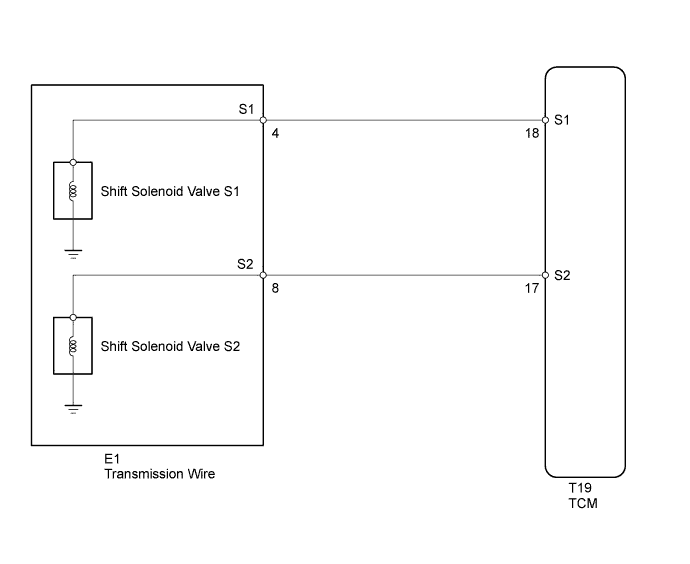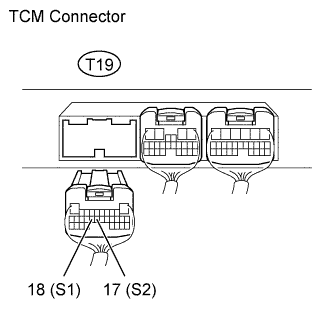Dtc P0973/62 Shift Solenoid A Control Circuit Low (Shift Solenoid Valve S1)
DESCRIPTION
MONITOR DESCRIPTION
WIRING DIAGRAM
INSPECTION PROCEDURE
INSPECT TRANSMISSION WIRE (SHIFT SOLENOID VALVE S1/S2)
CHECK WIRE HARNESS (SHIFT SOLENOID VALVE S1/S2 - TCM)
INSPECT SHIFT SOLENOID VALVE S1/S2
DTC P0973/62 Shift Solenoid "A" Control Circuit Low (Shift Solenoid Valve S1) |
DTC P0974/62 Shift Solenoid "A" Control Circuit High (Shift Solenoid Valve S1) |
DTC P0976/63 Shift Solenoid "B" Control Circuit Low (Shift Solenoid Valve S2) |
DTC P0977/63 Shift Solenoid "B" Control Circuit High (Shift Solenoid Valve S2) |
DESCRIPTION
Shifting from 1st to O/D is performed in combination with the on and off operation of the shift solenoid valves S1 and S2 controlled by the TCM. If an open or short circuit occurs in either of the shift solenoid valves, the TCM controls the remaining normal shift solenoid valve to allow the vehicle to be operated safely (fail-safe function).Fail-safe function:If either of the shift solenoid valve circuits develops an open or short circuit, the TCM turns the other shift solenoid on and off to shift to the gear positions shown in the table below. The TCM also turns the shift solenoid valve SL off at the same time. If both solenoids are malfunctioning, electronic hydraulic control does not operate and must be performed manually. Manual shifting as shown in the following table must be performed.In case of a short circuit, the TCM stops sending current to the circuit.Position
| Normal
| Shift Solenoid Valve S1 Malfunctioning
| Shift Solenoid Valve S2 Malfunctioning
| Both Solenoids Malfunctioning
|
Solenoid valve
| Gear
| Solenoid valve
| Gear
| Solenoid valve
| Gear
| Gear when shift lever is manually operated
|
S1
| S2
| S1
| S2
| S1
| S2
|
D
| ON
| OFF
| 1st
| X
| OFF
| O/D
| ON
| X
| 1st
| O/D
|
ON
| ON
| 2nd
| X
| ON
| 3rd
| ON
| X
| 1st
| O/D
|
OFF
| ON
| 3rd
| X
| ON
| 3rd
| OFF
| X
| O/D
| O/D
|
OFF
| OFF
| O/D
| X
| OFF
| O/D
| OFF
| X
| O/D
| O/D
|
3
| ON
| OFF
| 1st
| X
| OFF
| O/D
| ON
| X
| 1st
| O/D
|
ON
| ON
| 2nd
| X
| ON
| 3rd
| ON
| X
| 1st
| O/D
|
OFF
| ON
| 3rd
| X
| ON
| 3rd
| OFF
| X
| 3rd
| O/D
|
2
| ON
| OFF
| 1st
| X
| ON
| 3rd
| ON
| X
| 1st
| 3rd
|
ON
| ON
| 2nd
| X
| ON
| 3rd
| OFF
| X
| 3rd
| 3rd
|
L
| ON
| OFF
| 1st
| X
| OFF
| O/D
| ON
| X
| 1st
| 1st
|
- HINT:
- X: Malfunction
DTC Code
| DTC Detection Condition
| Trouble Area
|
P0973/62
| TCM detects short in solenoid valve S1 circuit 4 times when solenoid valve S1 is operated (1 trip detection logic)
| - Short in shift solenoid valve S1 circuit
- Shift solenoid valve S1
- TCM
|
P0974/62
| TCM detects open in solenoid valve S1 circuit 4 times when solenoid valve S1 is not operated (1 trip detection logic)
| - Open in shift solenoid valve S1 circuit
- Shift solenoid valve S1
- TCM
|
P0976/63
| TCM detects short in solenoid valve S2 circuit 4 times when solenoid valve S2 is operated (1 trip detection logic)
| - Short in shift solenoid valve S2 circuit
- Shift solenoid valve S2
- TCM
|
P0977/63
| TCM detects open in solenoid valve S2 circuit 4 times when solenoid valve S2 is not operated (1 trip detection logic)
| - Open in shift solenoid valve S2 circuit
- Shift solenoid valve S2
- TCM
|
MONITOR DESCRIPTION
The TCM controls gear shift by turning the shift solenoid valves on/off. When there is an open or short circuit in any shift solenoid valve circuit, the TCM detects the problem, illuminates the MIL and stores a DTC.The TCM performs the fail-safe function and turns the normally functioning shift solenoid valve on/off.In case of an open or short circuit, the TCM stops sending current to the circuit.
WIRING DIAGRAM
INSPECTION PROCEDURE
| 1.INSPECT TRANSMISSION WIRE (SHIFT SOLENOID VALVE S1/S2) |
Disconnect the E1 wire connector.
Measure the resistance of the transmission wire.
- Standard Resistance:
Tester Connection
| Condition
| Specified Condition
|
4 (S1) - Body ground
| 20°C (68°F)
| 11 to 15 Ω
|
8 (S2) - Body ground
| 20°C (68°F)
| 11 to 15 Ω
|
| 2.CHECK WIRE HARNESS (SHIFT SOLENOID VALVE S1/S2 - TCM) |
Disconnect the T19 TCM connector.
Measure the resistance of the wire harness side connector.
- Standard Resistance:
Tester Connection
| Condition
| Specified Condition
|
T19-18 (S1) - Body ground
| 20°C (68°F)
| 11 to 15 Ω
|
T19-17 (S2) - Body ground
| 20°C (68°F)
| 11 to 15 Ω
|
| | REPAIR OR REPLACE HARNESS OR CONNECTOR |
|
|
| 3.INSPECT SHIFT SOLENOID VALVE S1/S2 |
Remove the shift solenoid valve S1/S2.
Measure the resistance between the solenoid valve terminal and solenoid valve body.
- Standard Resistance:
Tester Connection
| Condition
| Specified Condition
|
Shift solenoid valve S1 connector terminal - Shift solenoid valve S1 body
| 20°C (68°F)
| 11 to 15 Ω
|
Shift solenoid valve S2 connector terminal - Shift solenoid valve S2 body
| 20°C (68°F)
| 11 to 15 Ω
|
Connect the battery's positive (+) lead to the terminal of the solenoid connector, and the negative (-) lead to the solenoid body.
Check the operating noise of the solenoid valve.
- OK:
- Solenoid makes operating noise.
| | REPLACE SHIFT SOLENOID VALVE S1/S2 |
|
|
| OK |
|
|
|
| REPLACE TRANSMISSION WIRE |
|



